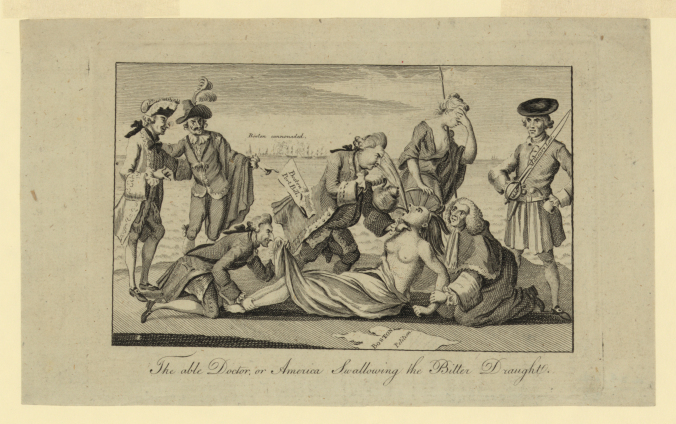The American Revolution is impossible to understand without food and sex at its center. The Boston Tea Party, a foundational moment of political rebellion, was a protest against tea, and tea itself was freighted with sexual meanings.
In the middle of the 1760s, the British Empire began tightening its grip on the colonies. Government officials started cracking down on smugglers. Navy captains were harassing merchants and their crews. To the radicals of North America, it looked like the British Parliament was engaged in a plot to enslave them, and a proper response would require “manly fortitude.” Then in 1767, a new tax on tea threatened to raise prices on a favorite beverage. The political times demanded a boycott, and the Boston radicals turned to women for support. In an “Address to the LADIES,” a newspaper writer urged women to “Throw aside” their tea if they wanted to appear “charming” and “lovely.” The poem’s last two lines promised a passionate reward: “Tho’ the times remain darkish, young men may be sparkish, / And love you much stronger than ever.” Women were presented with a choice, albeit on men’s terms: would they rather have tea, or the love of a patriotic suitor?

The sexually-charged nature of tea had infused Boston’s politics with long-standing debates about gender and sexuality. Tea, it turned out, was a radical beverage, because it reflected and constructed gender arrangements and sexual values. To understand how tea acquired these meanings, it is necessary to turn to a longer history of Europeans debating the merits of tea drinking by linking it with notions of proper and improper sexuality, and gender roles. These sexualized debates, like tea itself, were transmitted overseas to the American colonies.
Before 1680, most Europeans had never tasted tea, because only the richest could afford it. But very quickly over the course of the 1700s, tea became a major part of European trade and consumption, particularly in Great Britain and its colonies. Soon, tea drinking became a widespread daily habit. From the seventeenth century onward, writers debated tea: some promoted it as healthy, respectable, and good for the economy. (Indeed, many recognized that it was more invigorating than alcohol.) Others attacked tea as a needless, effeminate luxury, a corruption that caused several bodily ailments, and a debaucherous danger to society.
As tea was a foreign import, many discussions revolved around its perceived effects on the health and sexual morality of the European public. When tea first started becoming more common in England, for instance, tea drinking quickly became the subject of debate, and ideas about proper and improper sexuality bolstered both the case for tea and the case against it. Many supporters of the beverage were retailers or agents of the East India Company, which had a monopoly on the British purchase of tea in China. For these writers, tea was the drink of domestic respectability, and the tea table was a place where women might domesticate men. While men went out to taverns and coffeehouses to talk business and politics, women colonized the tea table at home, where they exercised more power. Women presided alluringly over the tea table: they assigned the tasks of making and pouring tea, they mapped out the limits of polite conversation, and they expected deference from men. Hostesses might invite neighbors or male suitors to tea, who were then expected to display their gallantry. A Dutch pamphlet even bragged that tea “strengthens the work of Venus serviceably for newlyweds.” These writers suggested that tea might strengthen both marital sex and family togetherness. Throughout Europe, questions of national prowess were linked to sexual health and strong families—such ideas migrated readily to colonial settlements.
At the same time, tea could be sexually dangerous. Idling at the tea table undermined masculinity and marriage, while tempting tea drinkers into abnormal desires. If women’s appetites could not be restrained, their thirst for tea (and the fancy porcelain that went with it) would destroy the country. Simon Mason, an English apothecary, fretted in 1745 over the many bad effects of working-class women drinking tea in the afternoon. Evil minds, under the influence of tea, would “prevent that quiet Harmony which ought to subsist betwixt Man and Wife, causeth Disobedience and domestic Strife, and at last the artful Husseys lay all the Blame on their Husbands.” The sexual debate over tea was part of a broader conversation about women’s extravagance. Bernard Mandeville, a Dutch-born doctor, wrote in 1714 that women would use “Deceit and vile Stratagems,” such as teasing, scolding, wheedling, and the exchange of sexual favors, to take all their husbands’ money and spend it on imported goods. They “act the Harlots with their Husbands,” profaning and prostituting “the Sacred Rites of Love” to the ignoble purpose of soliciting fancy things.
Other writers argued that Englishmen’s consumption of tea threatened their masculinity and undermined their sexual interest in women. A 1731 English pamphlet, Plain Reasons for the Growth of Sodomy, saw the threat plainly: boys were playing with dolls “and other girlish Employments, inviting and being invited to drink Tea with this or that School-fellow.” Such habits, which smacked of “Ignorance, Indolence, and Intemperance,” led down the road to sodomy. John Cleland’s Dictionary of Love (1753) defined a “Fribble” as “one of those ambiguous animals, who are neither male nor female; disclaimed by his own sex, and the scorn of both.” He preferred ladies’ amusements to “manly employments or exercise,” as was “as fond withal of scandal and all the tittle-tattle of the tea-table, as the veriest women.” A Fribble spent his time admiring ribbons, combing lapdogs, and consulting about tea and china. Tea undermined gender differences, masculinity, and by implication, normal sexuality. If tea weakened men, they would not be strong enough to defend the nation from its enemies. Over the course of the eighteenth century, as tea drinking became more popular, it retained its associations with femininity and sexual deviance. These controversies quickly made their way across the Atlantic to the British-American colonies.
When tea became the subject of political controversy in the colonies, it inflamed sexual politics, too. The sexualized language that characterized Europeans’ initial debates over tea informed the Americans’ resistance against Parliament. Many American colonists complained that Parliament’s tax on their tea imports was taxation without representation—a grave threat to freedom—which might in turn lead to enslavement. In protest, the Sons of Liberty (as the American radicals called themselves) organized boycotts of British imports, including tea. As these boycotts became linked to political rebellion, the insurgents could attack tea and Parliament using the same sexualized and gendered language that they had inherited from Europe and Great Britain. Rejecting tea meant rejecting a slavish (and feminine) attachment to luxury, and the nurturing of new forms of independence.
It was unclear, at least initially, whether women would get to share in this struggle for independence. For a boycott to work, the Sons of Liberty counted on “Daughters of Liberty” for cooperation. “We must … depend greatly upon the Female Sex,” the newspapers said. As a result, women suddenly gained power: in theory, they had a choice about whether to join the protests against Parliament. Many women enlisted eagerly in the fight: “rather than Freedom we part with our Tea.” Women might prove their sexual and civic virtue by abstaining from a luxury import (they were urged to drink local Labrador tea instead, an unappealing alternative). When government-supporting satirists mocked women for becoming involved in the politics of protest, women fought back, refusing to be “ridiculed by the little Wits and Foplings” who attacked them. Men might try to impugn the sexual reputation of female activists, but women in turn could attack their male critics as ungallant, and therefore, unmanly.
Men tried to police women’s sexuality and gendered behavior, but many women asserted their own choices about the drinks they consumed, testing the boundaries of patriarchal constraints. Some women continued to sip tea in the privacy of their own homes; in response, men became downright paranoid that the boycott might not hold. In 1768, one Boston satirist called his own daughters “two hearty trollups as any in town” for drinking tea. Another writer warned local women that if they kept drinking tea, they’d be supplanted by the mistresses of the British officials sent to enslave the colonists. A manly citizenry would be better able to protect them from assault than a “band of slaves.” The Sons of Liberty wanted women to abstain from tea, and they depended on women’s strength, but fretted over their independence. Sexualized language remained ready to serve as a tool to keep women and men in line. Eventually the boycotts did collapse, reducing the crisis—temporarily—from a boil to a simmer.
Then in 1773, a new British law made tea so seductive to Americans that an impassioned response became almost inevitable. The British Parliament passed the Tea Act, which actually lowered the price of tea for American consumers, while keeping the import tax in place. Samuel Adams, one of Boston’s leading protesters, saw a trap: the town of Boston would have to stand strong and refuse to allow the East India Company’s tea to land under the new law, because “he could not trust the private Virtue of his Countrymen in refraining from the Use of it.” As the Boston patriots had learned after a century of debate, tea was a temptation. If they allowed the tea to land, weak-minded colonists would surely drink it.
And so, on December 16, 1773, a few dozen Boston men boarded three merchant ships and dumped over 46 tons of tea into the harbor. When the British Parliament punished the entire town of Boston in response, the colonists demanded a new boycott of British goods, armed themselves for battle, and eventually declared independence. While men and women found some new opportunities to push at the boundaries of gender roles, the ethos of patriarchy largely remained intact. Indeed, independent Americans continued to enjoy their tea before they eventually settled for a less expensive cup of coffee.
The struggle for American liberty raised questions of political autonomy that were thoroughly gendered and sexualized. During the 1700s, tea had become a source of connections, talk, and private moments. It was even celebrated as a source of sexual and national health. Yet when the American Revolution opened up possibilities for an emerging new national identity, Americans interrogated their own tea drinking and found that their quest for a new identity would be thoroughly rooted in questions of proper sexual behavior. Sipping a cup of tea, or pushing it away, might invite criticism on sexual grounds. As the American colonists struggled for independence, they transgressed civic boundaries, but maintained the boundaries of gender and sexuality. Still, food and sex undeniably came together in the pouring of tea and the passions of revolution.
 Benjamin L. Carp is the Daniel M. Lyons Chair of American History and associate professor of early American history at Brooklyn College of the City University of New York. He is the author of Defiance of the Patriots: The Boston Tea Party and the Making of America (2010).
Benjamin L. Carp is the Daniel M. Lyons Chair of American History and associate professor of early American history at Brooklyn College of the City University of New York. He is the author of Defiance of the Patriots: The Boston Tea Party and the Making of America (2010).

NOTCHES: (re)marks on the history of sexuality is licensed under a Creative Commons Attribution-NonCommercial-NoDerivatives 4.0 International License.
Based on a work at www.notchesblog.com.
For permission to publish any NOTCHES post in whole or in part please contact the editors at NotchesBlog@gmail.com





Fascinating… Manhood balanced on the edge of a knife. I guess puritanical culture went deeper than I realized.